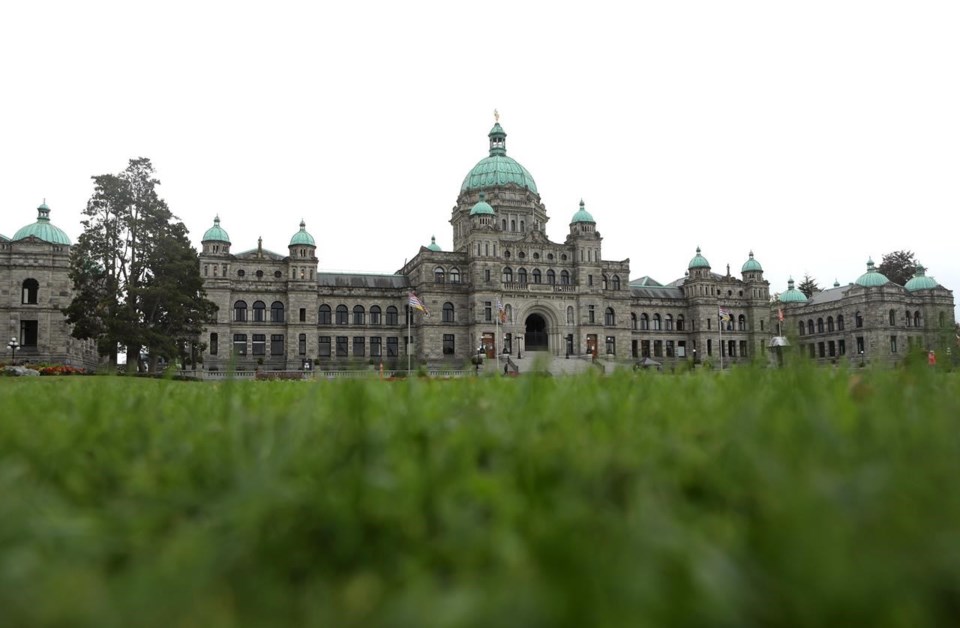VICTORIA — John Rustad's first question in British Columbia's legislature as the leader of the provincial Conservative Party prompted a stern rebuke from Premier David Eby, who accused him of picking on children and families.
Rustad, whose Conservatives gained official party status last month after former Opposition BC United member Bruce Banman crossed the floor to join him, zeroed in on the government's Sexual Orientation Gender Identity program in provincial schools, saying it is divisive and concerning to parents.
"Will the minister admit this SOGI 123 has been divisive and an assault on parents' rights and a distraction to student education?" said Rustad, who called on the government to replace the program.
B.C.'s SOGI program was introduced by the province to help make schools inclusive and safe for students of all sexual orientations and gender identities, says the government's website. Students are taught about sexual orientation and gender identity in a diverse society and the importance of treating everyone with dignity and respect, the website says.
Eby said Rustad, who was ejected from the BC United caucus in August 2022 for his anti-climate-change views, has not made an "auspicious" start with his first question in the legislature as the Conservative leader.
"To come into this place and use the authority of his office, his new party, to find a small group of kids to leverage that, to make them feel less safe in our schools, less safe in our communities, to feed the fires of division in our province and bring a culture war to B.C., it is not welcome," said Eby.
"Shame on him. Choose another question," said the premier to thunderous applause.
But Rustad said he's speaking up for the thousands of people with concerns about SOGI who have been staging protests in communities and at school board meetings.
"What I find most offensive is the division (that) is being created by what this government is implementing," he said.
Eby said it was "outrageous" for Rustad to stand in the legislature and pose questions that could result in harm to children.
"He sees political advantage in picking on kids and families and teachers and schools who are just trying to do their best for kids who are at risk of suicide," he said.
The return of politicians to the legislature marked a session that now features four parties: the NDP, BC United, Green Party and Conservative Party of B.C.
While it's the first time four parties are represented with "official status" in the legislature, it's not the only time four parties have had MLAs in the legislature, said the Office of the B.C. Clerk.
The uproar in the legislature came just after the government introduced new emergency management and disaster legislation that represents the first update on disaster management policy in three decades.
The legislation will deliver a modernized emergency and disaster management approach that is aligned with international best practices to ensure communities are safer and more resilient, Emergency Management Minister Bowinn Ma said.
The bill would update what constitutes an emergency to reflect modern realities and risks, and provides improved tools for response and recovery, Ma said.
The proposed changes come as B.C. experienced its worst wildfire season on record, with as many as 400 structures lost and a price tag nearing $1 billion. The wildfires this summer forced thousands of B.C. residents from their homes, and recent floods, landslides and wildfires also saw many thousands evacuate communities.
"It is no longer good enough for us to be only focused on response, then recovery," Ma said at a news conference after introducing the legislation. "We must also be better at being proactive for and mitigating disasters before they happen."
She said the legislation, the most progressive and comprehensive in Canada, will provide preparation and protection for people and communities in B.C.
"It embraces disaster risk reduction and will require that climate risk be assessed so that entities can better mitigate the impacts of climate-related emergencies before they happen," Ma said in the legislature.
A 14-member premier's emergency expert task force, made up of Indigenous and community leaders, government officials, firefighters and academics, will provide advice on preparedness, mitigation, response and recovery opportunities that could be ready for the 2024 wildfire season, she said.
Ma said among the opportunities the task force will explore are: incorporating local volunteer resources for wildfire responses, modernizing community delivery of emergency support services and identifying options to assist First Nations and local authorities to improve evacuation orders and alerts awareness and compliance.
The legislation will replace the Emergency Program Act, which has not been updated since 1993, she said.
Modernized emergency management regulations, developed in consultation with First Nations, will be phased in, starting later this year, Ma said.
The legislation was introduced as B.C. ombudsperson Jay Chalke released a report that raised concerns about fairness in the government's delivery of Emergency Support Services and Disaster Financial Assistance, both designed to help people during climate-related disasters.
Ma acknowledged Chalke's report, calling it "valuable" and said the recommendations are "not a surprise."
But she said much of Chalke's report focused on issues connected to the 2021 wildfire season, which the government has improved or resolved.
This report by The Canadian Press was first published Oct. 3, 2023.
Dirk Meissner, The Canadian Press



